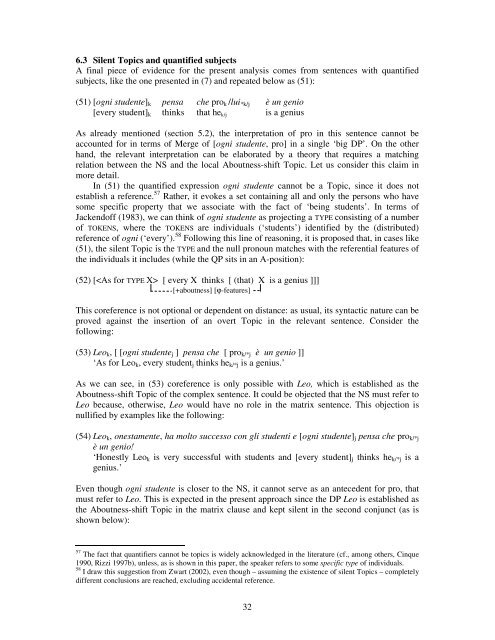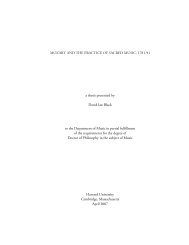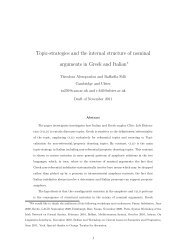Subjects, Topics and the Interpretation of Referential pro.
Subjects, Topics and the Interpretation of Referential pro.
Subjects, Topics and the Interpretation of Referential pro.
Create successful ePaper yourself
Turn your PDF publications into a flip-book with our unique Google optimized e-Paper software.
6.3 Silent <strong>Topics</strong> <strong>and</strong> quantified subjects<br />
A final piece <strong>of</strong> evidence for <strong>the</strong> present analysis comes from sentences with quantified<br />
subjects, like <strong>the</strong> one presented in (7) <strong>and</strong> repeated below as (51):<br />
(51) [ogni studente]k pensa che <strong>pro</strong>k /lui*k/j è un genio<br />
[every student]k thinks that hek/j is a genius<br />
As already mentioned (section 5.2), <strong>the</strong> interpretation <strong>of</strong> <strong>pro</strong> in this sentence cannot be<br />
accounted for in terms <strong>of</strong> Merge <strong>of</strong> [ogni studente, <strong>pro</strong>] in a single ‘big DP’. On <strong>the</strong> o<strong>the</strong>r<br />
h<strong>and</strong>, <strong>the</strong> relevant interpretation can be elaborated by a <strong>the</strong>ory that requires a matching<br />
relation between <strong>the</strong> NS <strong>and</strong> <strong>the</strong> local Aboutness-shift Topic. Let us consider this claim in<br />
more detail.<br />
In (51) <strong>the</strong> quantified expression ogni studente cannot be a Topic, since it does not<br />
establish a reference. 57 Ra<strong>the</strong>r, it evokes a set containing all <strong>and</strong> only <strong>the</strong> persons who have<br />
some specific <strong>pro</strong>perty that we associate with <strong>the</strong> fact <strong>of</strong> ‘being students’. In terms <strong>of</strong><br />
Jackend<strong>of</strong>f (1983), we can think <strong>of</strong> ogni studente as <strong>pro</strong>jecting a TYPE consisting <strong>of</strong> a number<br />
<strong>of</strong> TOKENS, where <strong>the</strong> TOKENS are individuals (‘students’) identified by <strong>the</strong> (distributed)<br />
reference <strong>of</strong> ogni (‘every’). 58 Following this line <strong>of</strong> reasoning, it is <strong>pro</strong>posed that, in cases like<br />
(51), <strong>the</strong> silent Topic is <strong>the</strong> TYPE <strong>and</strong> <strong>the</strong> null <strong>pro</strong>noun matches with <strong>the</strong> referential features <strong>of</strong><br />
<strong>the</strong> individuals it includes (while <strong>the</strong> QP sits in an A-position):<br />
(52) [ [ every X thinks [ (that) X is a genius ]]]<br />
[+aboutness] [ϕ-features]<br />
This coreference is not optional or dependent on distance: as usual, its syntactic nature can be<br />
<strong>pro</strong>ved against <strong>the</strong> insertion <strong>of</strong> an overt Topic in <strong>the</strong> relevant sentence. Consider <strong>the</strong><br />
following:<br />
(53) Leok, [ [ogni studentej ] pensa che [ <strong>pro</strong>k/*j è un genio ]]<br />
‘As for Leok, every studentj thinks hek/*j is a genius.’<br />
As we can see, in (53) coreference is only possible with Leo, which is established as <strong>the</strong><br />
Aboutness-shift Topic <strong>of</strong> <strong>the</strong> complex sentence. It could be objected that <strong>the</strong> NS must refer to<br />
Leo because, o<strong>the</strong>rwise, Leo would have no role in <strong>the</strong> matrix sentence. This objection is<br />
nullified by examples like <strong>the</strong> following:<br />
(54) Leok, onestamente, ha molto successo con gli studenti e [ogni studente]j pensa che <strong>pro</strong>k/*j<br />
è un genio!<br />
‘Honestly Leok is very successful with students <strong>and</strong> [every student]j thinks hek/*j is a<br />
genius.’<br />
Even though ogni studente is closer to <strong>the</strong> NS, it cannot serve as an antecedent for <strong>pro</strong>, that<br />
must refer to Leo. This is expected in <strong>the</strong> present ap<strong>pro</strong>ach since <strong>the</strong> DP Leo is established as<br />
<strong>the</strong> Aboutness-shift Topic in <strong>the</strong> matrix clause <strong>and</strong> kept silent in <strong>the</strong> second conjunct (as is<br />
shown below):<br />
57 The fact that quantifiers cannot be topics is widely acknowledged in <strong>the</strong> literature (cf., among o<strong>the</strong>rs, Cinque<br />
1990, Rizzi 1997b), unless, as is shown in this paper, <strong>the</strong> speaker refers to some specific type <strong>of</strong> individuals.<br />
58 I draw this suggestion from Zwart (2002), even though – assuming <strong>the</strong> existence <strong>of</strong> silent <strong>Topics</strong> – completely<br />
different conclusions are reached, excluding accidental reference.<br />
32
















